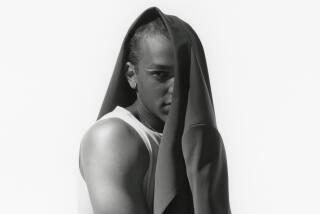Savile Row Tailor Re-Creates Cary Grant Look in Miniseries About Heiress
- Share via
Cary Grant, in the ‘30s and ‘40s, wore his suits with the equivalent of Joan Crawford shoulders.
The shoulders were unusually exaggerated, measuring some 6 1/2 inches wide.
“It was a particularly good style for him, because he had small, sloping shoulders and a big head,” pointed out Edward Sexton, a prominent Savile Row tailor.
Sexton was hired to re-create Grant’s made-to-order suits for James Read, the actor who will portray him in the NBC miniseries, “Poor Little Rich Girl: The Barbara Hutton Story,” with Farrah Fawcett in the title role.
It’s currently in production in London, tentatively scheduled to air this fall. And coincidentally, Sexton said, both actors wore a 41 long.
Sexton discovered Grant’s unusual suit cut when he set out to research clothes of the period. He began by studying photographs of Grant during the time of his marriage to Hutton.
Grant’s suits were made in London’s Savile Row at Kilgoul, French and Stanbury, where Sexton served his apprenticeship. Sexton also consulted his mentor, tailor Harry Helman, to learn about construction and details, such as the appropriate peak of the lapel.
“I wanted to really get down into the guts of the garment,” explained Sexton, a refined Englishman. “The emphasis was shoulders and hips, and all the expression came through drape.”
Actually, Sexton’s Hollywood assignment wasn’t much of a stretch for him. During a visit here this week (which included fittings for some of his local clientele, including producer Steve Sohmer and actor Michael Nouri), Sexton explained that men today are returning to the days of big shoulders and full fit.
“It’s definitely happening already, and the mere fact that the movie is coming out is a timely coincidence,” he said.
These days, American men also happen to be lining up for custom-made English suits as never before.
Although Savile Row tailors currently face the threat of a new zoning bill that could substantially increase rents, Sexton claims that these are excellent times for the prestigious address.
“I think because times are so good, landlords think we should be paying more,” he said. “If the bill is passed, our rents could go up, so the price of clothes could go up, but I doubt very much this will happen.” Sexton’s suits now sell for $1,200 and up.
In the meantime, tailors like Sexton have spruced up their operations.
“The old school was so snobbish they only relied on personal recommendations for clients.” Sexton now drums up business by “going on the road” to major American cities, where he says he has a captive audience.
He is also negotiating a licensing arrangement for a collection of expensive off-the-rack men’s clothing to be manufactured in America.
“Rather than sit on our backsides waiting for someone to push open the door,” he said, “we’re much more aware of marketing.”
One member of the audience is Michael Nouri, the actor who starred in the movie “Flashdance” and the television miniseries “Rage of Angels.”
Nouri, you understand, is not your average everyday Reeboks-and-jeans-grade actor.
While being fitted by Sexton for a new tuxedo in a suite at the Century Plaza Hotel, which functioned temporarily as Savile Row West, there was also talk of Nouri’s new sleeping suit (pajamas), made-to-measure, monogrammed shirts and matching boxer shorts.
He orders two or three units--be it a suit, sport coat or overcoat--per year, not including boxer shorts.
“You can really tell the difference between an off-the-rack and a custom-made suit,” Nouri said, as he showed off the working buttons on the sleeve of a sport jacket. “They’re made of horn.”
“The very first time I had a suit made in London was 1964, after I graduated from high school. I paid for it with money I worked for and saved,” he said, adding that his father also had his suits made in London.
The first suit Nouri bought, from English tailor Henry Poole, cost $150.
“That first suit lasted me for years,” he said. During that trip, he ordered his first pair of custom-made shoes from John Lobb, also for $150.
“But now I seldom dress up during the day,” Nouri said, gesturing to the sweat pants he was planning to change into.
“It’s one of the things I miss about the East Coast.”
More to Read
The complete guide to home viewing
Get Screen Gab for everything about the TV shows and streaming movies everyone’s talking about.
You may occasionally receive promotional content from the Los Angeles Times.






